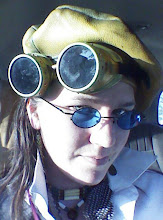Recently, (actually last night) I did an author/book interview for The Steam Runner. One of the many questions I was asked about the book was what made it stand apart from other self-published books. Now, at first, this make me think of how different the book was in all it's forms, then it made me think about the message I was trying to send. However, I finally came to the conclusion--that in some part--it was about my long-standing dislike with the weak female in literature (especially romance novels). Now, Gary (my husband) came in to sat down and listen to me read back the interview with my responses. Oddly, when I came to this question he pointed that I should add more about the other reason why my book is different from other self-published books (which you can read in the interview later). With some nagging in my head, I went to bed and closed my computer
Today I got up and the question started plaguing my mind again; my answer did.
Recently, I'd watched a video on youtube about female tropes in video games. I found it thought-provoking as a gamer--a female gamer. I'd never seen it that way before. But, there you had it; women being used in a number of video games as devices or objects for the male hero's or champion's growth. Now, don't get me wrong. It doesn't bother me if someone uses it as a device. It only bothers me when there's so little on the opposite side of the fence.
That prompted me today to look at some of her other videos. One in particular about the Woman in Refrigerators trope. It just sounded odd so I had to watch it. (You can view the video here.)
But all this comes back to my response.
I grew up watching Buffy the Vampire Slayer as a kid. I liked women like Laura Croft in her movie (based on the game Tomb Raider) who weren't anymore afraid to take their clothes off and strut around naked as they day they were born as much as some men would (typically) in a movie (to fluster a female character). I liked woman who could get out a sticky situation on their own and did. I enjoyed stories where she wasn't always be saved, but also did the saving.
When I created Tes I created a character that could stand on her own, who could save herself, who didn't always need someone to back her up--male or female. Watching these videos has given me ideas for future novels in order to combat these tropes and stereotypes. It's not that they're bad; it's that there's too many of them.
We as authors, creators, artists, and visionaries need to stand up and and empower female characters we create. Not so there are stories without male characters growing from the tragedy of a female character, but so there are more stories where this is either reversed or doesn't happen at all. It's not about balance; it's about showing men, women, girls, and boys that women don't always need to saved, they don't always need to be captured, they don't always have to be the ones standing aside who can't solve the problem instead of their male counterparts. We need to give generations a viewpoint that different and shows them they can aspire to being more than a plot device for the growth another character--male or female.
We need female heroes who are the stars of their own stories and save their love interest, if they have one.
That's all I'm saying.
Subscribe to:
Post Comments (Atom)




0 comments:
Post a Comment